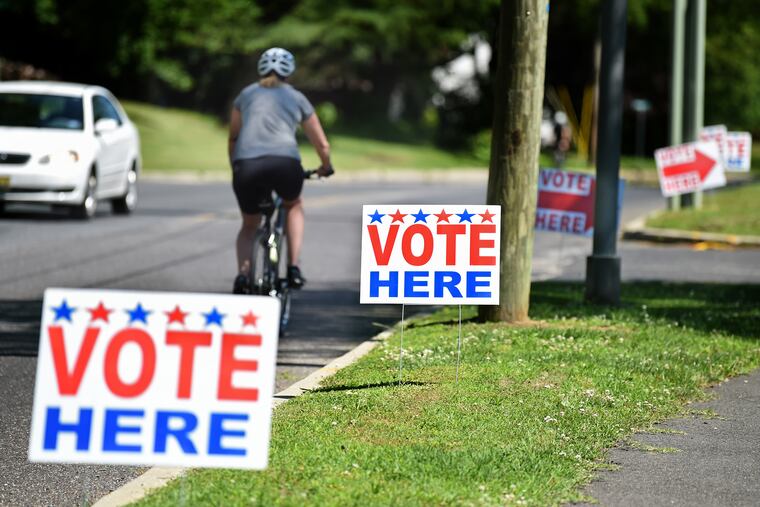2019 New Jersey primary election: What you need to know
Challenges to Democratic organization in Camden County Assembly races are the highlights of Tuesday's primary elections in South Jersey.

For South Jersey, the biggest story in Tuesday’s partisan primaries figures to be the challenge to the dominant Camden County Democratic machine and its unofficial leader, insurance executive George E. Norcross III, by a group of progressive Democrats.
The insurgents say they have about 20 candidates on their slate running for Assembly, county clerk, and mayor or council positions in the county’s three biggest municipalities — Cherry Hill, Camden, and Gloucester Township — and six other towns.
It’s been a battle, with the county clerk, a party regular, disqualifying the group’s nominees for the Board of Freeholders. And then came the phantom candidates, names placed on the ballot without any real campaigns; the progressives say they were put up to it by the machine to clutter the ballot, and the party leadership says it’s the progressives who are running “ghosts.”
In addition, the group is running a number of candidates for seats on the Camden County Democratic Committee, taking the fight to the heart of the party organization.
Assembly races
New Jersey voters on Tuesday will chose the Democratic and Republican nominees for all 80 seats in the Assembly ahead of the general election in November.
Only a relative handful of the party primaries across the state are contested, four of them in South Jersey legislative districts.
8th District: President Donald Trump seems to pervade all levels of politics, and he is the main point of contention in the Republican primary for Assembly in this district, which lies mostly in Burlington County, with several Camden County towns and one in Atlantic County. And it’s also about local frictions. Incumbent Republican Joe Howarth lost the imprimatur of the powerful Burlington County GOP when leaders suspected he was about to bolt to the Democrats, as the district’s Sen. Dawn Marie Addiego did last year. So the party gave its endorsement — along with the valuable first column on the ballot — to retiring Sheriff Jean Stanfield and first-term Assemblyman Ryan Peters. Howarth, who had a moderate record, rebranded himself as a Trump acolyte and qualified for the ballot under the “MAGA Republican” label. He says his opponents are disloyal to the president. Attorney R. Jason Huf, a Lumberton resident, is running alone in the primary under the “Fresh Leadership” banner.
The Democrats also have a contested primary in the 8th District, but the three candidates are all newcomers. John “Johnny" Bravo of Marlton is running as “A True Democrat” for one of two Assembly seats against endorsed Democratic candidates Gina LaPlaca of Lumberton and Mark Natale of Marlton, who are running as “Burlington County Regular Democrats.” Both are lawyers.
3rd District: Incumbent Democratic Assemblymen John Burzichelli and Adam Taliaferro face a challenge in the primary from John Kalnas, a Gibbstown retiree who ran for the seat in 2015 and 2017. The 3rd District includes all of Salem County and parts of Gloucester and Cumberland Counties.
6th District: Two challengers encouraged by the South Jersey Progress Democrats grassroots group are challenging the incumbent Democrats, Assemblyman Louis Greenwald, the majority leader in the lower house, and Assemblywoman Pamela Lampitt. The newcomers are Julian Jordan III and Danie Moss-Velasco.
Polling place hours, locations, and what else to know before voting
Polling place hours and locations: New Jersey polling places are open from 6 a.m. until 8 p.m. Go to the Department of State’s website (https://bit.ly/1lZ6JCc) to find your polling place.
Party affiliations matter: New Jersey is considered a closed primary state, but unaffiliated voters can declare a party up to or on election day and vote for that party’s nominees in a primary election. In November’s general election, all voters will be able to cast ballots regardless of party affiliation.
Voter ID rules: The New Jersey Department of State says you may be asked to show ID if you didn’t provide it while registering to vote or if there was information that couldn’t be verified. That ID could range from a driver’s license to a utility bill.
Write-in votes: If you have a candidate in mind whose name doesn’t appear on the ballot, choosing to write in the candidate’s name could be an option. New Jersey allows voters to name anyone as a write-in candidate — that’s how three members of Bergen County school boards were elected last fall.
Voting rights: As a registered voter, you have rights protected under federal and state laws. New Jersey’s “Voters’ Bill of Rights,” available in multiple languages, outlines everything from ID requirements to what you might see in polling places as a first-time voter. Further protections, from accessibility rights for those with disabilities to rights for ex-felons, can be found on the Department of State’s website, https://bit.ly/2ERq3EL,
What to do if you have problems at the polls: Voter intimidation, coercion, threats, and anything else that hinders a person from voting fairly is considered a civil rights violation of federal election law, according to the U.S. government’s explanation of voting and election laws. New Jersey’s Division of Elections’ voting information and assistance number is 1-877-NJ-VOTER (658-6837). Contact information for each county’s election office is on the Department of State’s website.
Staff writer Patricia Madej contributed to this article.